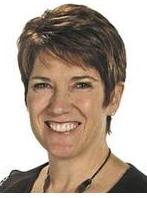For those of you that do not know Jana Wiggins, the CEO of Document Advantage Corporation, (DocuVantage), you may enjoy this brief executive profile in the Tampa Bay Business Journal. 
DocuVantage, is a Tampa-based company, founded in 1999 that has grown from a document management and business process automation consulting services provider to creating their signature SaaS (Software-as-a-Service) Enterprise Document and Content Management software platform used by companies of every size and local, state and federal agencies.
Reprint from the Tampa Bay Business Journal
Who am I?
Name: Jana Wiggins
Title and company: President and CEO, Document Advantage Corporation Document Advantage Corporation, (DocuVantage), (DocuVantage)
Years with the company: 11
Years in Tampa Bay: 10
Nature of business: Business information management software and services
Education: Master’s Certificate in Business, Tulane University
Where you grew up and what it was like: I grew up in Northern Virginia, the suburbs of Washington, D.C. It is a fast-paced area that offers a variety of things to do for everyone. Whether you wanted to go to the mountains and hike the falls, head to the beach in the summer, sightsee or just go into town for dinner, you never run out of things to do.
Tips of the trade
How do you manage the information flow? I am connected 24/7. Using our own products, information is automatically routed and sends alerts when something needs my attention. Other technologies handle phone calls and e-mails so the key is prioritizing the massive amounts of information.
How do you keep yourself current in your field? I follow technology. But it isn’t enough to be current; you have to predict the future in order to stay ahead when creating solutions that companies will find valuable. I receive alerts on what competitors are announcing so I know of any new developments to ensure we have it or something better already in our product. Communications between prospects and clients provide the information we use to continually enhance our product and ensure our product is meeting their needs.
Where do you get new ideas? I use our technology daily so many ideas come from my own use. Others come from our prospects that may have a challenge that we have not seen before, but most of our ideas come from talking to our clients.
What’s a valuable lesson a mentor taught you related to your profession? Two that stand out are build a core team with people who are as passionate as I am and build the core application on what you know customers will find valuable and buy. Make it integrated, scalable and enterprise ready out of the gate, then add the nice to haves.
Background check
What was your first paid job? Pet-sitting for neighbors when they were on vacation
What did you want to be when you grew up? A veterinarian
What’s the most personal item in your office and why is it there? Generally, you can find a colored picture that one of my friends’ children or a niece or nephew drew for me. Looking at their artwork always brings a smile.
If you weren’t in your current career, what would you be doing? Working for a nonprofit
What is your favorite activity with your family? Sitting on a quiet beach with no interruptions
If you could have dinner with one person you’ve never met, who would it be and why? The president of the United States. It doesn’t matter what party they represent, I would like to know what the surprises were once they took office and would they do anything different if they had known prior to coming to office.
Who are your heroes in the business world and why? Those in the business world who “step up” — step up and share, protect, make a difference and are accountable for not only what they do but for the actions of those that they lead or are responsible for
Words to the wise
How could Tampa Bay change to be more business friendly? Build a high-speed rail system. You cannot be a successful metropolitan area attracting job-creating businesses if the workers must live within 20 miles of the office in order to get to their workplaces in 30 minutes. The more reach that businesses have in attracting workers the faster the employment rates will grow.
Universities should talk to small businesses, not just the large businesses, on what their needs are and create a curriculum with mandatory internships that feed skilled students to the smaller businesses. There needs to be an incentive for professors to ensure their students are trained and ensure the students go out and get jobs that are out there.
Online video here
